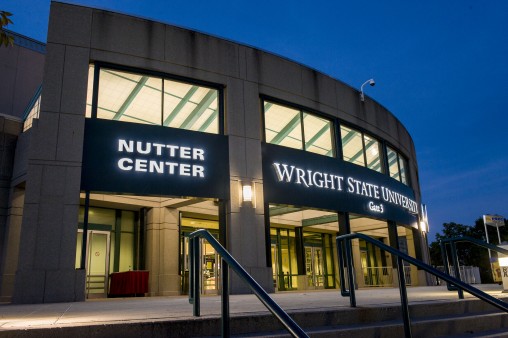Excerpt

Wright State University Nutter Center
Wright State University is considering outsourcing management of the Nutter Center in the school’s quest to further stabilize its budget.
University officials are in ongoing discussions about bringing in outside management companies to operate the Nutter Center, said chief real estate and facilities officer Greg Sample during a board of trustees meeting on Friday.
Sample also is president of Double Bowler Properties, a Wright State nonprofit organization that has been used to buy property and expand the university’s footprint. Sample said he has no estimate or goal for how much money the university would like to save or boost revenue by, if outside management is hired.
Wright State is still in the early stages of exploring outsourcing the Nutter Center’s management, said provost Tom Sudkamp.
“It will be looked at, along with other outsourcing possibilities,” Sudkamp said. “Can we run the building more efficiently? Could outsourcing reduce expenses or potentially get more revenue? We really won’t know until we look at the options that are available.”
The possible Nutter Center change comes as Wright State trustees in June slashed $30.8 million from the school’s 2018 budget in an attempt to correct years of overspending but more work is needed.
Wright State overspent its fiscal year 2017 budget by $24.6 million. While that’s about $6 million less than originally projected, administrators and trustees are intent on preventing it from happening again.
In hiring a management firm to run the Nutter Center, Wright State would seek to boost the arena’s finances while also bettering its use for the community, creating a “balancing act” of priorities, Sample said.
A big factor in the decision is how much access students would have to use the facility if management is outsourced, Sample said. Currently, the McLin Gym is available to students on weekends because the university operates it but that might not be an option if management is outsourced.
The arena is also home to some of Wright State’s academic programs, officials said.
“That especially is not an easy decision,” Sample said. “We have had folks approach us and that’s no secret.”
Usage of the Nutter Center will be part of Wright State’s ongoing budget considerations, according to a budget remediation plan given to the board Friday morning.
An analysis of a WSU audit in December showed that revenue has dipped by around $500,000 at the Nutter Center over 17 years.
The revenue dip follows a decrease in the number of events at the Nutter Center since 2010, which makes boosting profits even more difficult. The Nutter Center’s main arena vacancy rate over the past three academic years meant it went unused more than 160 days a year, according to the audit.
The Nutter Center has been the home of several organizations aside from Wright State including the debunked Dayton Bombers hockey team.
But, the athletics department is “the last tenant left in that building,” athletic director Bob Grant said on Friday. While Grant said that the university’s teams love playing in the Nutter Center, he said that “buildings like that do not make money.”
“We love playing in that building. It is a delight. It has a big time feel to it,” Grant said.
Wright State University needs to make up more than $9 million in revenue in order to meet its budget goal this year.
The shortfall was partially caused by enrollment declines over summer and fall, meaning the school is down a total of $9.1 million in tuition in fees compared to this time last year, according to a budget report presented to the board of trustees on Friday. The university has also received around $1 million less in gifts and contributions this year than last year, according to the report.
Despite the loss, WSU vice president and business of finance Jeff Ulliman reported on Friday that there is a “very reasonable chance” the school could avoid entering state fiscal watch.
That’s because Wright State plans to primarily make up tuition and fee losses through job attrition along with a $1.5-million reduction in discretionary spending.
There are an estimated 70 to 80 vacant positions on campus now that are saving the university around $3.25 million, according to a budget report. The university estimates around another 100 more positions will be left vacant later this year and could save the school another $4.5 million.
The university is currently only filling positions that are deemed highly necessary but that wasn’t good enough for some trustees on Friday. Bruce Langos and Michael Bridges, both trustees, said that the university might want to consider an outright hiring freeze until the school’s budget is in better shape.
“I just don’t want to lift our foot off the peddle until we start to really move forward and we’re not moving forward yet,” Bridges said. “We just need to keep that vigilance up.”
Read the entire story at daytondailynews.com

 Wright State to launch mobile street medicine project for underserved patients in Dayton
Wright State to launch mobile street medicine project for underserved patients in Dayton  Top 10 Wright State Newsroom videos of 2024
Top 10 Wright State Newsroom videos of 2024  2025 Alumni Achievement Awards celebrate distinguished Wright State community members
2025 Alumni Achievement Awards celebrate distinguished Wright State community members  Wright State alum partners with alma mater to brew a Raider-branded beer
Wright State alum partners with alma mater to brew a Raider-branded beer  Expanded agreement provides Air Force researchers more access to work on Wright State’s campus
Expanded agreement provides Air Force researchers more access to work on Wright State’s campus 